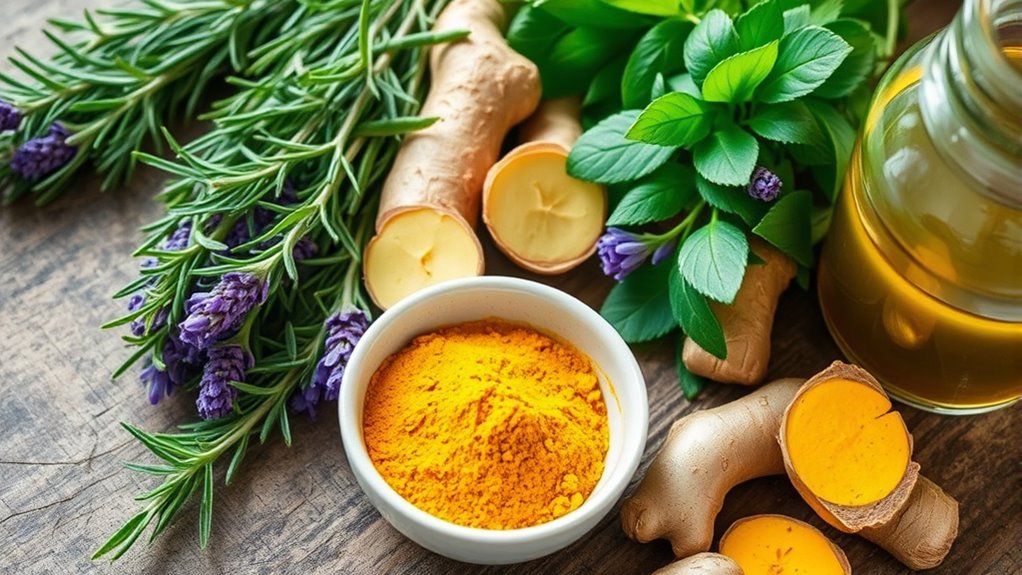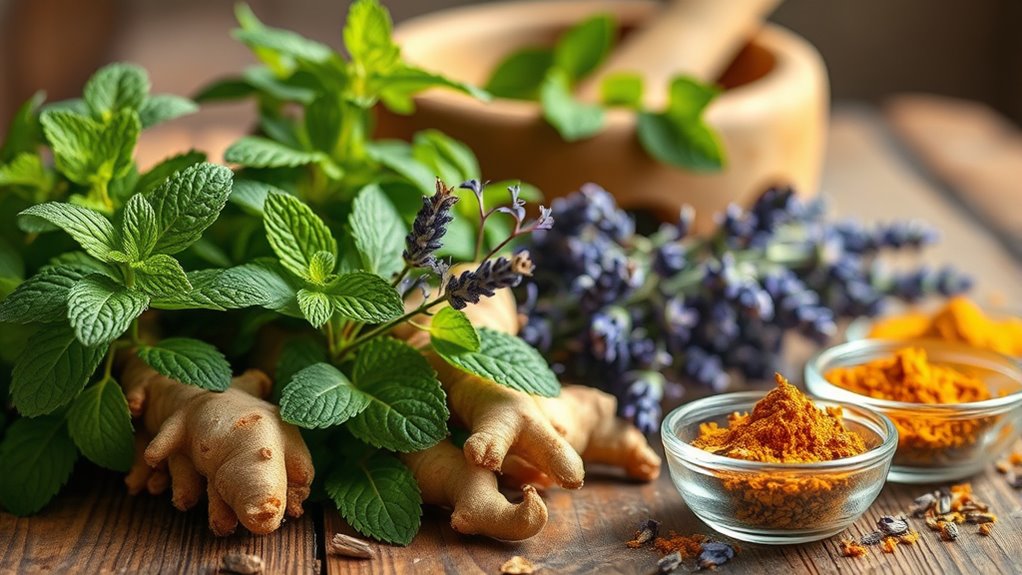Herbal remedies like turmeric, ginger, boswellia, devil’s claw, and willow bark can help reduce arthritis pain and inflammation naturally. You can add turmeric to your meals, brew ginger or devil’s claw as tea, or take supplements for other herbs. These options may ease joint discomfort and improve mobility with fewer side effects. To safely integrate these remedies into your routine, it’s best to consult a healthcare professional—exploring further can reveal how they fit into a holistic approach.
Key Takeaways
- Herbs like turmeric, ginger, boswellia, devil’s claw, and willow bark have anti-inflammatory and pain-relieving properties for arthritis.
- These herbs can be incorporated as supplements, teas, or added to meals for natural symptom relief.
- Combining herbal remedies with diet, exercise, and rest enhances overall arthritis management.
- Consult healthcare providers before starting herbal treatments to avoid interactions and ensure proper dosage.
- Proper sourcing and supervision reduce risks of side effects, making herbal remedies a safe complementary option.

If arthritis pain is affecting your daily life, exploring herbal remedies can offer natural relief without the side effects often associated with medications. Many seek out alternative medicine options because they prefer holistic approaches that work with your body’s natural processes. Herbal preparations have been used for centuries to reduce inflammation, ease joint pain, and improve mobility. These remedies can be incorporated into your routine with minimal risk, especially when you choose high-quality, reputable sources.
You might consider herbal preparations like turmeric, which contains curcumin, known for its powerful anti-inflammatory properties. Turmeric can be added to your meals or taken as a supplement. Its ability to block certain inflammatory pathways makes it an appealing choice for managing arthritis symptoms. Similarly, ginger acts as a natural pain reliever and anti-inflammatory agent. You can brew fresh ginger tea or take it in supplement form, helping to reduce joint swelling and discomfort.
Another herbal option worth exploring is boswellia, also called Indian frankincense. This resin extract has shown promising results in decreasing inflammation and improving joint function. It’s often found in supplement form and can be a helpful addition to your arthritis management plan. Additionally, devil’s claw, native to Africa, has been traditionally used to combat pain and inflammation. Whether taken as a capsule or brewed as a tea, it might provide relief without the harsh side effects of some pharmaceuticals.
Herbal remedies are often most effective when used consistently and as part of a broader approach that includes proper diet, gentle exercise, and adequate rest. While these herbal preparations can be beneficial, it’s important to consult with a healthcare professional before starting any new supplement, especially if you’re already on medication or have underlying health conditions. Some herbs can interact with medications or cause allergic reactions, so professional guidance helps guarantee safety.
You may also find relief with willow bark, which contains salicin, a compound related to aspirin. This natural remedy can help alleviate pain and reduce inflammation. However, it’s vital to use it under supervision, as it can cause side effects similar to aspirin, such as stomach upset or bleeding risks.
Frequently Asked Questions
Are Herbal Remedies Safe Long-Term for Arthritis?
You’re wondering about the long-term safety of herbal remedies for arthritis. While they can be helpful, you should be cautious, as some herbs may cause adverse herbal interactions over time. It is crucial to consult your healthcare provider before using herbal remedies long-term, especially if you’re on other medications. Monitoring for side effects and periodic evaluations can help ensure you’re using these remedies safely and effectively for your arthritis management.
Can Herbal Treatments Replace Conventional Arthritis Medications?
Did you know that about 60% of people with arthritis explore herbal treatments alongside conventional medicine? While herbal synergy and traditional use suggest potential benefits, herbal remedies shouldn’t substitute your prescribed medications without consulting your doctor. They can complement your treatment, but relying solely on them might risk inadequate symptom control. Always discuss any herbal options with your healthcare provider to ensure safe and effective arthritis management.
Which Herbs Are Best for Specific Types of Arthritis?
You should consider herbal combinations tailored to specific arthritis types, as traditional uses verify their effectiveness. For osteoarthritis, herbs like turmeric and ginger are popular for their anti-inflammatory properties. For rheumatoid arthritis, herbs such as boswellia and willow bark may help reduce pain and swelling. Always research traditional uses and consult a healthcare professional to ensure these herbs suit your condition and won’t interact with medications.
How Quickly Do Herbal Remedies Relieve Arthritis Symptoms?
Imagine your body opening like a blooming flower—herbal remedies can ease arthritis symptoms, but how quickly? It varies with herbal absorption rates and individual differences. Sometimes, you might feel relief within days; other times, it takes weeks. Don’t forget, the placebo effects of herbs can also influence how fast you notice improvements. Patience and consistency are your allies, helping nature’s gentle touch work its magic over time.
Are There Any Side Effects From Herbal Arthritis Treatments?
You might wonder if herbal arthritis treatments have side effects. While herbal safety varies, many herbs are well-tolerated, but some can cause allergic reactions or interact with medications. Long-term effects aren’t fully known for all herbs, so it’s wise to consult your healthcare provider before starting them. Monitoring your body’s response helps guarantee safe use, and staying informed about potential risks supports overall health.
Conclusion
Incorporating herbal remedies into your arthritis management plan can offer relief and reduce inflammation naturally. Did you know that studies show over 60% of people with arthritis find herbal treatments effective? By exploring options like turmeric, ginger, or willow bark, you might discover a gentle, drug-free way to ease your pain. Always consult your healthcare provider before starting new remedies, but don’t overlook the power of nature in supporting your joint health.










